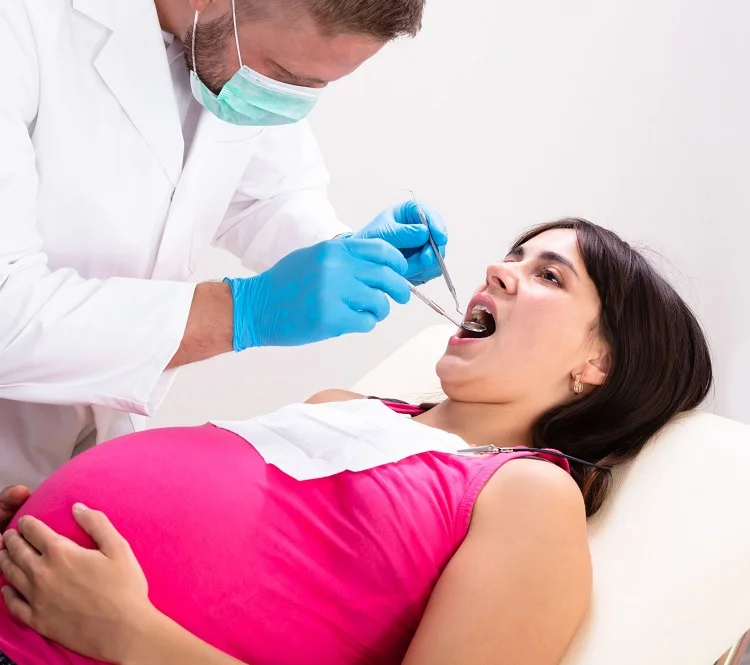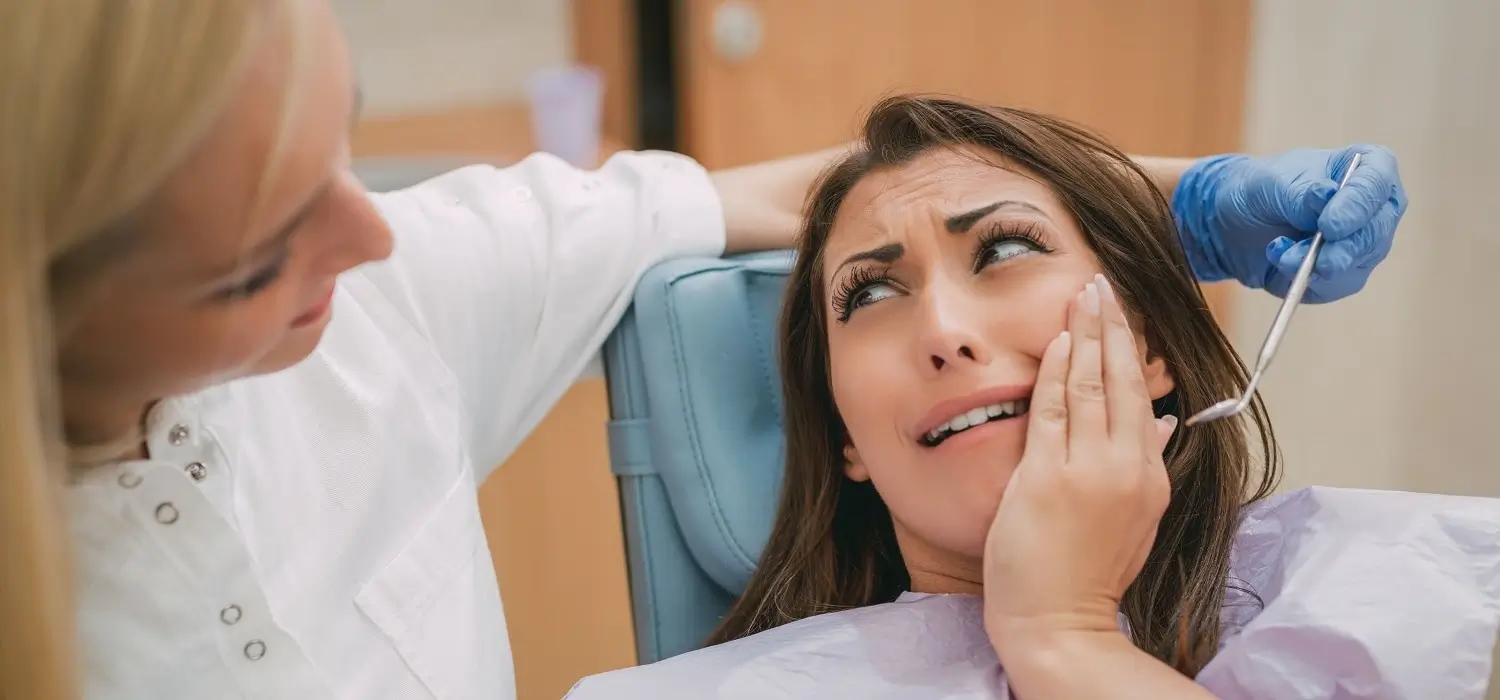Last Updated on: 10th December 2025, 06:30 am
Is it common to have dental pain during pregnancy? Pregnancy is an exciting and wonderful time, but it comes with challenges, including dental pain. During pregnancy, hormonal and physical changes increase the risk of dental problems that can cause pain.
Causes of Dental Pain in Pregnancy
There are two main causes of dental pain during pregnancy: gum disease and cavities.
Gingivitis and Periodontal Disease
Gingivitis is an inflammation of the gums, which may cause dental pain. If it reaches advanced stages without treatment, it can weaken the bone that supports the teeth, leading to infection, pain, and even tooth loss. It is generally caused by an accumulation of bacteria and food debris on or between the teeth (plaque); but during pregnancy, specific factors could contribute to its development:
1. Hormonal changes: These can cause the body to overreact to the presence of bacteria, causing severe inflammation of the gums.
2. Gingival enlargement: The enlargement of the gums is also known as gingival hyperplasia. It can be caused by the same hormonal changes or by the consumption of certain medications, such as nifedipine, a calcium channel blocker used to treat high blood pressure during pregnancy.
Caries
Caries are the degradation of the teeth, which occurs when bacteria produce acid as a result of contact with food debris, especially sugars. When the caries is advanced, holes are formed in the teeth; and if they reach the nerve inside, they can generate pain. Deep cavities also lead to dental infections, which can be painful as well as dangerous for both the mother and fetus.
The Risk of Developing Cavities in Pregnancy Increases Due to Several Factors
1. Nausea: During the first months of pregnancy, it is common for many expectant mothers to have problems brushing their teeth, due to an increased gag reflex when the back of the mouth comes in contact with a toothbrush.
2. Vomiting: Morning vomiting causes stomach acids to damage the surface of the teeth, causing lesions known as erosions. These make the teeth more prone to decay and increase dental sensitivity.
3. Excessive consumption of sugars: Hormonal changes can lead to increased anxiety, which then leads to increased consumption of carbohydrates and sugary foods.
Even with the above conditions clarified, it is important to mention that deep cavities that cause pain require months and even years to form, so if the pain due to cavities occurs during pregnancy, they have begun to damage the tooth well before conception.
6 Ways to Avoid Dental Pain During Pregnancy
1. Prevention
Although in many cases pregnancies are not planned, it is recommended that women who plan to conceive go for a prior dental check-up. In this way, the dentist can identify cavities or other problems that could cause dental pain during pregnancy and perform a professional dental cleaning with the application of fluoride to strengthen the teeth and prevent cavities.
2. Regular visits to the dentist
Pregnancies are often a surprise. If so, a dental examination is recommended during the first trimester, depending on how much the mother can tolerate during the visit. The idea is to identify cavities or any active infection that could cause problems later in pregnancy. Depending upon the needs of the mother, the dentist could schedule 2 or 3 visits during the gestation period.
3. Maintain good oral hygiene
It is important to brush your teeth at least twice a day with fluoride-containing toothpaste and to floss daily. To reduce nausea during brushing, it is advisable to use a small bristle brush. Soft bristle brushes are also recommended to avoid irritating the gums.
4. Healthy nutrition
Reduce the consumption of sugary foods as well as sugary and acidic drinks. It is recommended to increase the consumption of fruits and vegetables.
5. Not brushing teeth right after vomiting
It is normal to want to brush your teeth after vomiting. However, rubbing the acids left in the mouth after vomiting against the surface of the teeth could damage them. Therefore, use fluoride rinses after vomiting and wait a couple of hours before brushing your teeth.
6. Salt water rinses
Warm salt water rinses can relieve sore and swollen gums. Add a tablespoon of salt to a glass of warm water and rinse your mouth with the solution for about 30 seconds.
Safe Treatments for Dental Pain during Pregnancy
1. In general, most dental treatments are safe during pregnancy. For example, there are safe anesthetics for pregnant women, and taking X-rays is not a risk for the baby as long as a lead apron is used for protection.
2. Usually, during pregnancy, only treatments that cannot wait are carried out. This is preferred as a matter of comfort since in the first months, nausea can make a dental consultation difficult. In the last trimester, the weight of the baby can complicate accommodation to the dental chair. Consequently, the second trimester is often chosen to perform needed dental procedures.
3. In pregnant patients without complications, treatments such as restorations or fillings, root canal treatments, and even dental extractions can be carried out without a major problem. However, if the mother has had health problems during pregnancy, it is important to bring them to the attention of the dentist to take the appropriate measures.
Medicines for Dental Pain During Pregnancy
Drug use during pregnancy should be approached with caution. One of the safest medications during pregnancy is paracetamol; however, it is not recommended to self-medicate. Whenever dental pain occurs, there is a cause to be solved by a dentist to eliminate the pain.
Although pain relievers decrease pain, they do not solve the problem. This can be dangerous in cases of infection, since if it progresses it could compromise the life of the mother and the baby.
When to see a Dentist During Pregnancy?
See your dentist if you have any of the following symptoms:
• Dental pain
• Bleeding or swollen gums
• Tooth decay or holes in the teeth
• Swelling of the cheeks or gums
• Infection or suppuration
• Discomfort after previous treatments, such as dental restorations.
It is important to tell your dentist that you are pregnant and discuss any dental concerns or problems you may have during your appointment.
Conclusion
Pregnancy brings with it a series of physical and hormonal changes that can cause and accelerate dental health problems.
Although most dental treatments are safe during pregnancy, it is advisable to stabilize the state of the patient’s dental health before conception or during the first months of pregnancy to avoid painful or infectious episodes as much as possible that could compromise the general health of the mother and the baby.
Frequently Asked Questions
Can you get a toothache while pregnant?
Yes, you can get a toothache while pregnant. Hormonal and physical changes during pregnancy can increase the risk of dental issues like gum disease and cavities, which can cause toothaches.
What are the common dental concerns during pregnancy?
Yes, pregnant women can have sensitive teeth. Hormonal changes during pregnancy can lead to gum inflammation and increased sensitivity to hot, cold, or sweet foods.
When to see a dentist during pregnancy?
You should see a dentist during pregnancy if you experience any of the following:
- Dental pain
- Bleeding or swollen gums
- Tooth decay or holes in the teeth
- Swelling of the cheeks or gums
- Infection or pus
- Discomfort after previous treatments like dental restorations
How do I handle tooth pain during pregnancy?
Most dental treatments are safe during pregnancy. This includes:
- Anesthetics that are safe for pregnant women
- X-rays with a lead apron for protection
- Restorations or fillings
- Root canal treatments
- Dental extractions
- It is advisable to perform necessary dental procedures during the second trimester when nausea and physical discomfort are minimal.
Ways to Avoid Dental Pain During Pregnancy
To avoid dental pain during pregnancy, consider the following tips:
- Prevention: Have a dental check-up before conceiving or during early pregnancy to address any potential issues.
- Regular Visits: Schedule dental exams during the first trimester and follow-up visits as needed.
- Good Oral Hygiene: Brush teeth at least twice a day with fluoride toothpaste and floss daily. Use a small, soft-bristle brush if experiencing nausea.
- Healthy Nutrition: Limit sugary and acidic foods and drinks. Increase intake of fruits and vegetables.
- Post-Vomiting Care: Rinse your mouth with fluoride rinse after vomiting and wait a couple of hours before brushing.
- Salt Water Rinses: Rinse with warm salt water to relieve sore and swollen gums.
Maintaining good oral hygiene and regular dental check-ups can help prevent dental issues and manage any pain during pregnancy.
Share:
References
1. Gülmezoglu, A. M., & Hofmeyr, G. J. (2000). Calcium channel blockers for potential impaired fetal growth. Cochrane Database of Systematic Reviews, 2, CD000049. https://www.cochranelibrary.com/cdsr/doi/10.1002/14651858.CD000049/full#CD000049-abs-0001
2. Higuera, V. (Aug 27, 2019).Pregnancy teeth pain: Causes, treatments, and home remedies. Healthline. https://www.healthline.com/health/pregnancy/pregnancy-teeth-pain
3. Nifedipine. (Oct 1, 2020). MotherToBaby. https://mothertobaby.org/es/hojas-informativas/nifedipine/
4. Tooth pain during pregnancy: What you can do about it. (Dec 27, 2019). The Mighty Mouth. https://www.themightymouth.org/tooth-pain-during-pregnancy-what-you-can-do-about-it
5. Pregnancy Gingivitis: Causes, Treatment & Prevention. (s. f.). Cleveland Clinic. https://my.clevelandclinic.org/health/diseases/22484-pregnancy-gingivitis
6. Pregnancy and Dental Work (Dec 9, 2021). American Pregnancy Association. https://americanpregnancy.org/healthy-pregnancy/is-it-safe/dental-work-and-pregnancy/
7. Lonzer, J. (Apr 28, 2021). Oral hygiene and dental care during pregnancy. Consult QD. https://consultqd.clevelandclinic.org/oral-hygiene-and-dental-care-during-pregnancy/
8. Mark, A. M. (2021). Pregnancy and oral health. The Journal of the American Dental Association, 152(3), 252. https://doi.org/10.1016/j.adaj.2020.12.009
9. Wu, M., Chen, S. W., & Jiang, S. Y. (2015). Relationship between Gingival Inflammation and Pregnancy. Mediators of Inflammation, 2015, 1-11. https://doi.org/10.1155/2015/623427
10. X-Rays/Radiographs in pregnancy (Dec 1, 2021) American Dental Association. https://www.ada.org/resources/research/science-and-research-institute/oral-health-topics/x-rays-radiographs
-
Nayibe Cubillos M. [Author]
Pharmaceutical Chemestry |Pharmaceutical Process Management | Pharmaceutical Care | Pharmaceutical Services Audit | Pharmaceutical Services Process Consulting | Content Project Manager | SEO Knowledge | Content Writer | Leadership | Scrum Master
View all posts
A healthcare writer with a solid background in pharmaceutical chemistry and a thorough understanding of Colombian regulatory processes and comprehensive sector management, she has significant experience coordinating and leading multidisciplina...



















